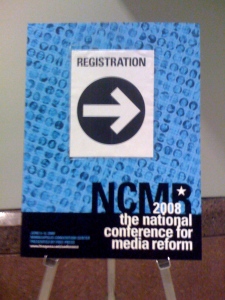Today was the first day of the National Conference for Media Reform (NCMR) at the Minneapolis Convention Center. I had prior engagements in the morning and had to miss the opening keynote by Mayor Rybak and Senator Klobuchar titled “Welcome to Minneapolis”. This was all fine since I live here anyway.
The first session I attended today was Future of the Internet: Open, Neutral, Mobile and Ubiquitous and it focused mainly on Net Neutrality. Toward the beginning, I saw a couple friends and fellow twitterers Ed Kohler and Ward Tongen. Just then I noticed a reply on a blog post I made yesterday from Twitterer John Breyault that he was in the same session as I. How cool is that? Hopefully I’ll meet up with him in the next couple days.
Regarding the session, Moderator Timothy Karr gave a US Web update. The US is falling behind on broadband as other countries are surpassing us. It turns out that Japan Internet users pay half the price and have faster access. Of course, AT&T, Comcast, and Verizon would love to get involved so we could pay even more (that last sentence is my spiel).
Tim Wu was the first panelist to speak. He actually turned from the dark side as he used to sell services to where the government chooses what Internet access users have, which is basically a discriminatory Internet. He also sold to corporations who wanted to control which sites their employees go to. He claimed we don’t have the broadband infrastructure that we should. A suggestion that he made was to have alternative means of bandwidth that is not controlled by big telco or cable, or even to provide wireless bandwidth to a length that we’ve never seen before.
Next up was Eloise-Rose S. Lee from Media Alliance and wound up receiving audience applause as being the panelist that is or was not a lawyer. 🙂 Due to restarting the laptop I missed most of what she said although her presentation was very short, too. She thinks a solution can be found on the local level. Start communication from the ground up, and not from the top down.
Next to speak was Jef Pearlman of Public Knowledge and was there to talk about wireless and initiatives moving forward. The premise was that the Internet is going global. People text, use wifi, and the phone will even eventually go through the Internet. He also pointed out a text messaging statement snafu made by Verizon.
He then went through three initiatives, although it went by quickly and I wasn’t able to take the best notes. One was on Verizon buying C Block, and part of the rules is that anyone who uses it has to allow any access to get through, which does sound like a good thing although my personal knowledge on that is limited. He also mentioned a grass roots activist group that would use bandwidth from unused television sets in 2009 when analog goes digital.
Last up was an energetic Susan Crawford. As a member of ICANN, she is very concerned about the future of the Internet. Telco says that the Internet is being ruined because they’re not making enough money from it (shocker). She also mentioned that there are 40 countries that censor their Internet to limit what their people can see, and our government wants to do the same thing. There’s certainly a connection with big telco and our government (at least with our current administration). One way would be to charge video one way, cell phone another, etc.
She was happy to present OneWebDay.org to us, which is essentially an Earth Day for the Internet. This year it will be on September 22. The idea is to focus attention on online audience participation, local Internet concerns, and to create a global constituency that cares about defending the Internet.
That was quite a lot of note taking but hopefully worth it. The next session has plenty of notes as well.
The second and last session of the day was titled Minnesota Model: Countering Corporate Media. This premise was about the big dailies declination and how smaller and niche newspapers have countered. Their was problems with the videos so unfortunately accompanying Powerpoints were not available.
First up was Jeremy Iggers from the Twin Cities Media Alliance and of the Daily Planet. He actually credits Freepress.net to their success. He points out that they have one or two articles by citizen journalists every day, and they also provide many sources of education. He drew laughter from the crowd when he mentioned one of these was called “Facebook for geezers”.
Regarding the citizen journalists, the Daily Planet uses that term because they want to be known as more than bloggers. They don’t just put anything up there and they do have editors that strictly goes through every article to ensure they are up to par.
Next up is Vickie Evans-Nash from the Minnesota Spokesman Recorder. This publication is definitely what many search marketers will call “hyper-local”. It’s been around for 75 years and offers stories “for the people”. They use people in mostly African American neighborhoods who know and have lived in these neighborhoods for a long time. She credits this motto to their continued success.
They also do special things for the community. Every year they do a black senior month. They ask these seniors that have lived there for awhile how the city and neighborhood has changed and what advice they would give to younger people. They also showcase local talent such as African American students that have graduated from different schools in the state and special notices when minorities own sports teams, etc.
Janis Lane-Ewart from KFAI is up next. Countering the corporate media is probably the subset for KFAI’s mission. Years ago, they didn’t have a program that talked about controversial issues such as GLBT or people who spoke other languages and wanted to build an avenue to absolutely include everyone. They’ve recently directed programs for the younger folks as well as they have lacked that audience. It wound up that KFAI was one of the first radio stations to have 12 different languages in their programming so everyone can have a chance to voice their radio opinions.
Next Up? Kathy Magnuson from the Minnesota Women’s Press. She started out by stating they wanted to cover two types of stories. One is to cover stories that others are not. The other way is by covering stories that others carry as well, but to put a woman’s spin on it.
An example is a pretty sad story that happened last winter. A toddler was found outside barefoot in the snow and cold. Police found him, brought him home and the mother was not there. As soon as she came home, the policemen immediately arrested her and threw her in jail. This is the mainstream story from a man’s point of view.
It turns out that she definitely did make a huge mistake. She decided to not wake her child when she received a desperate phone call from a friend with a gravely sick child. She obviously made the wrong decision, but was not a wrong person. This was written from the Women’s press from a woman’s point of view.
Subprime mortgages is also something they wrote about that mainstream did not. She described that women are more apt to get roped into subprime mortgages. Women are 30% of all borrowers but 39% of all subprime victims.
Last up was Sarah Lutman, VP of American Public Media, parent of Minnesota Public Radio. One of the first things she mentioned was that public inside journalism is a big part of what they are currently doing. At any given time, someone was providing their staff with information about a story that they weren’t able to get. Over the last four years, they have been able to receive over 50,000 public journalists to help them out.
I had a big grin on my face when she said that Twitter has been a great example of public journalism. During last week’s Barack Obama event at the X, hundreds of people sent MPR tweets of what was currently going on, both inside and outside of the arena. What a great example of how to use Twitter!
They also do a lot of live music for their “The Current” FM radio station. Whether it’s in a studio or playing a show, a lot of that music is on YouTube. She even mentioned podcasting as another way of using social media. Big kudos to MPR as this is some of the info I was looking for in the first place – great uses of social media from non-search marketers.
Tomorrow will be day two and I plan to write up notes again, but probably not quite as much. I really enjoy it, but I spent a lot of energy typing away and think I could have done a better job doing more listening to what they have to say where it soaks in quite a bit more.








 Posted by Paul Jahn
Posted by Paul Jahn 




